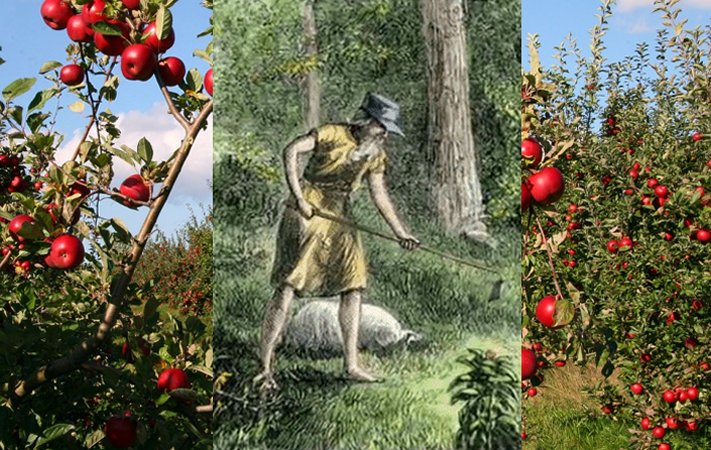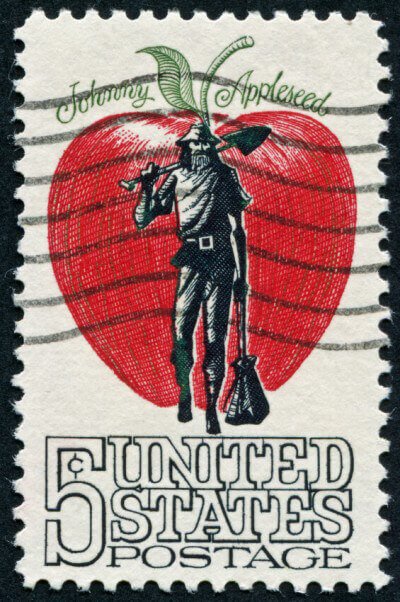Ellen Lloyd - AncientPages.com - Thomas Jefferson once said – “The greatest service which can be rendered to any country is to add a useful plant to its culture,” and that’s exactly what Johnny Appleseed did through his work and dedication.
Image in the middle: John Chapman from Harper's New Monthly Magazine, 1871
Nothing could stop Johnny Appleseed from wandering the countryside, planting apple seeds in the 1800s. His dream was to produce so many apples that no one had to be hungry. This eccentric man, who was remarkable in many ways, is today remembered as a beloved American folk hero. He was the one who planted and supplied apple trees to much of the United States of America.
There are so many legends about Johnny Appleseed that it’s easy to forget who the real man was.
Johnny Appleseed Was A Real Historical Person
Johnny Appleseed, whose name was John Chapman from the beginning, was born in Leominster, Massachusetts, in 1774.
John started to travel alone in his twenties, and that’s how he spent most of his life. He was America’s first organic orchard man, and he was always welcomed by settlers and Native Americans, who treated him as a wandering shaman. He was well-known for his spirituality and pacifism, and he seemed to be as much at home with the red men of the forest as with his own race. John learned how to survive in the woods with few tools and food. There are many legends about his unusual physical prowess, toughness, and endurance.
Locals remember him as a person who could walk many miles on ice on bare feet in winter. One day a man gave Johnny Appleseed shoes because it was so cold. The next day, he was walking barefoot again. When asked what happened to his shoes, he replied he had given them to someone in greater need than him.
Credit: bestapples.com
“He is reported to have lived one whole winter on “butternuts.” He is also said to have floated many miles down French Creek “on a cake of ice.” Paddling his canoe down the Allegheny River when there was much ice on the stream, he pulled his craft onto a block of ice, so the story goes, lay down inside the canoe and went to sleep. He was a hundred miles below his intended destination when he woke up.
The image of him sleeping in the canoe on the floating ice suggests his confidence and lack of hurry or concern about reaching his destination. He was at home and at ease with his wandering, dreamy and confident of his destiny,” Robert Morgan writes in the book Lions of the West.
Even during the War of 1812, conflict was fought between the United States, the United Kingdom, and their respective allies. John wandered across the country, carrying a leather bag filled with apple seeds. That’s how he got his nickname - the “apple seed man.” Later he became known as Johnny Appleseed. He often quoted Biblical scriptures and said God protected his mission and him. He was also a devoted follower of Emanuel Swedenborg.
He visited several settlements, and children, women, and men loved him. His appearance gave the impression that he was poor, but it’s not true. He did earn money by selling his apple trees, but he often preferred to trade food or clothing rather than collect money for his trees. To him, it was more important that a settler planted an apple tree than pay him for it.
Drawing of Jonathan Chapman, aka Johnny Appleseed. H. S. Knapp - A History of the Pioneer and Modern Times of Ashland County. Philadelphia: J. B. Lippincott & Co. (1862). Credit: Public Domain
He lived among many Indian tribes and learned their languages. He spent his time in nature and never killed any animals for survival. There was no need, he said, because nature provided him with the necessary food. He was famous for his ascetic diet, and he was only sick once in his life.
Johnny Appleseed died of pneumonia at the age of seventy. Different dates are listed for his death, but most likely, he passed away in March 1845.
He had spent over 50 years walking across the United States planting apple trees. This remarkable man introduced apple trees to large parts of Pennsylvania, Ontario, Ohio, Indiana, Illinois, and the northern counties of present-day West Virginia. One can easily say that Johnny Appleseed had lived his dream.
Johnny Appleseed may be gone, but he is certainly not forgotten. According to Howard Means, author of Johnny Appleseed: The Man, the Myth, the American Story, “no American folk hero has been more widely and diversely celebrated than Johnny Appleseed.”
Many movies and books have been produced in honor of this exceptional man. Children love to hear about his adventures, and so do adults. He is an American legend and is celebrated as a national hero.
Written by Ellen Lloyd – AncientPages.com
Updated on November 18, 2023
Copyright © AncientPages.com All rights reserved. This material may not be published, broadcast, rewritten or redistributed in whole or part without the express written permission of AncientPages.com
Expand for references






